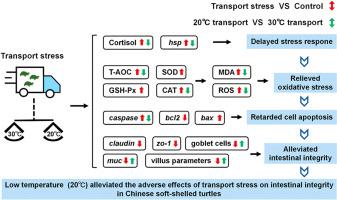低温缓解了模拟运输应激对中华鳖肠道健康的不利影响
IF 4.1
2区 农林科学
Q1 FISHERIES
引用次数: 0
摘要
运输应激始终对水生动物构成威胁。在中华鳖的实际生产中,低温运输通常被用来缓解运输应激,但其对中华鳖肠道屏障的影响仍不清楚。本研究将中华鳖(初始体重 200±20 g)分别置于对照温度(30 °C)和低温(20 °C)下模拟运输应激 12 小时,然后恢复 24 小时,每个处理设 4 个重复,每个重复包含 4 只中华鳖。结果表明,运输诱导肠绒毛出现明显的形态学和组织学损伤,紧密连接相关基因表达下调。此外,运输组的鳖在肠道中表现出氧化应激,刺激了生理解毒反应和细胞凋亡。低温运输通过缓解应激反应对鳖肠道的运输应激起到缓解作用。具体而言,低温组的肠绒毛/嵴(V/C)比和紧密连接基因的表达量明显高于对照温度组,而肠道皮质醇水平和 hsp 表达量等应激反应参数则明显低于低温组。此外,与对照温度组相比,低温缓解了运输应激引起的氧化损伤和细胞凋亡。然而,低温对中华鳖肠道的保护作用是有限的,尤其是在温度恢复阶段之后。总之,本研究结果表明,运输应激会导致肠道完整性破坏和氧化损伤,同时也会激活鳖的粘膜免疫和抗氧化酶系统反应。研究还表明,低温可通过调节氧化状态和细胞凋亡缓解运输应激对肠道完整性的不利影响,而温度恢复后的影响则要小得多。本文章由计算机程序翻译,如有差异,请以英文原文为准。

Low temperature alleviated the adverse effects of simulated transport stress on the intestinal health in Chinese soft-shelled turtle Pelodiscus sinensis
Transport stress always poses a threat to aquatic animals. Transportation under low temperatures was often used to relieve transport stress in practical production of Chinese soft-shelled turtle Pelodiscus sinensis, but their effect on the turtle's intestinal barrier remains unclear. In this study, P. sinensis (initial weight 200 ± 20 g) were exposed to simulated transport stress for 12 h at control (30 °C) and low (20 °C) temperature, and then recovery for 24 h, and each treatment had 4 replicates with each replicate containing 4 turtles. The results showed that transportation induced obvious morphological and histological damages in intestinal villus, with a down-regulated expression of the tight junction related genes. Besides turtles in transport group showed an oxidative stress in intestine, which stimulated a physiological detoxification response together with apoptosis. Low temperature transport plays a mitigative effect on the transport stress of turtle intestine via relieved stress response. Specifically, the intestinal villus/crypt (V/C) ratio and the expression of tight junction genes in the low-temperature group were significantly higher compared to the control temperature group, while stress response parameters such as intestinal cortisol levels and hsp expression were significantly lower in the low-temperature group. Additionally, low temperature alleviated oxidative damage and apoptosis caused by transport stress relative to the control temperature group. However, the protective effect of low temperature on P. sinensis intestine was limited, especially after the temperature recovery stage. Overall, the findings of the present study demonstrated that transport stress would induce the disruption of intestinal integrity and oxidative damage, also activated the mucosal immunity and antioxidant enzyme system response of turtles. It was also suggested that low temperature could alleviate the adverse effects of transport stress on intestinal integrity through modulation of oxidative status and apoptosis, whereas much less impact after temperature recovery.
求助全文
通过发布文献求助,成功后即可免费获取论文全文。
去求助
来源期刊

Fish & shellfish immunology
农林科学-海洋与淡水生物学
CiteScore
7.50
自引率
19.10%
发文量
750
审稿时长
68 days
期刊介绍:
Fish and Shellfish Immunology rapidly publishes high-quality, peer-refereed contributions in the expanding fields of fish and shellfish immunology. It presents studies on the basic mechanisms of both the specific and non-specific defense systems, the cells, tissues, and humoral factors involved, their dependence on environmental and intrinsic factors, response to pathogens, response to vaccination, and applied studies on the development of specific vaccines for use in the aquaculture industry.
 求助内容:
求助内容: 应助结果提醒方式:
应助结果提醒方式:


